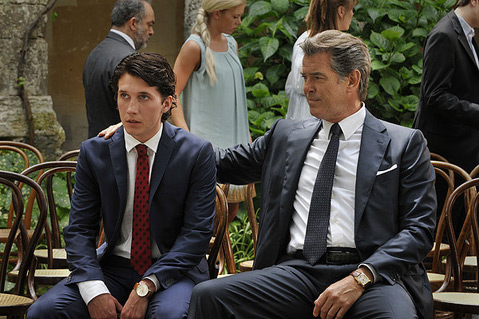Love Is All You Need
Trine Dyrholm, Pierce Brosnan, and Molly Blixt Egelind star in a film written by Anders Thomas Jensen and Susanne Bier and directed by Bier.

Just beyond sundown, in an Italian lagoon, a woman takes a languishing swim in the nude. She’s unusually nude, in fact, by movie-world standards, from her post-chemo bald head, past her post-mastectomy breast, to her toes. How could emotionally chilly business mogul Pierce Brosnan, who urges her out of the water, warning of riptides, not begin to fall in love with her? It’s a beautiful, pivotal, and also slightly startling scene in the midst of the Danish film Love Is All You Need, writer-director Susanne Bier’s refreshingly different take on the wedding gone wrong — or sideways — setup.
It’s not that Bier is willfully packing art-house tactics or deconstructing the rules of the romantic-comedy genre here. Take the smarmy English title (the Danish title is the more fitting but less marketable The Bald Hairdresser), or the kitschy touch of featuring Dean Martin oozing “That’s Amore,” among other sentimental maneuvers. Clichés line the route, as things go awry in a wedding of young Danes on a ravishing Mediterranean property in Italy. (It was shot in Sorrento: Sign me up, Orbitz.)
But warm gusts of more sincere emotionality also show up, and the anchoring romantic narrative, ebbing and flowing throughout the film, involves Brosnan’s cool, business-headed character, a widower who has lost touch with his heart, and a working-class breast-cancer and cheating-husband survivor (the wonderful and subtle actress Trine Dyrholm), who challenges his haughtiness and begins to chip away at his armor.
Echoes of films past inevitably sneak into the picture. Brosnan is surprisingly good here, a different kind of character wallowing in Mediterranean climes compared to his unfortunate role in Mamma Mia! We also get some of that culture-envy sensation from the wonderful Danish film Italian for Beginners, in which reserved Danes nursed dreams of warm, histrionic Italy. Where Bier’s film gains some distinction is from another narrative anomaly in the realm of movie archetypes, the one about the middle-aged cancer victim gaining an upper hand on not only her health but her sense of empowerment and deeper well-being. Sure, the fairy-tale factor runs a bit thick, but the sentiment works out to be a nice one in this agreeable lark of a film.



